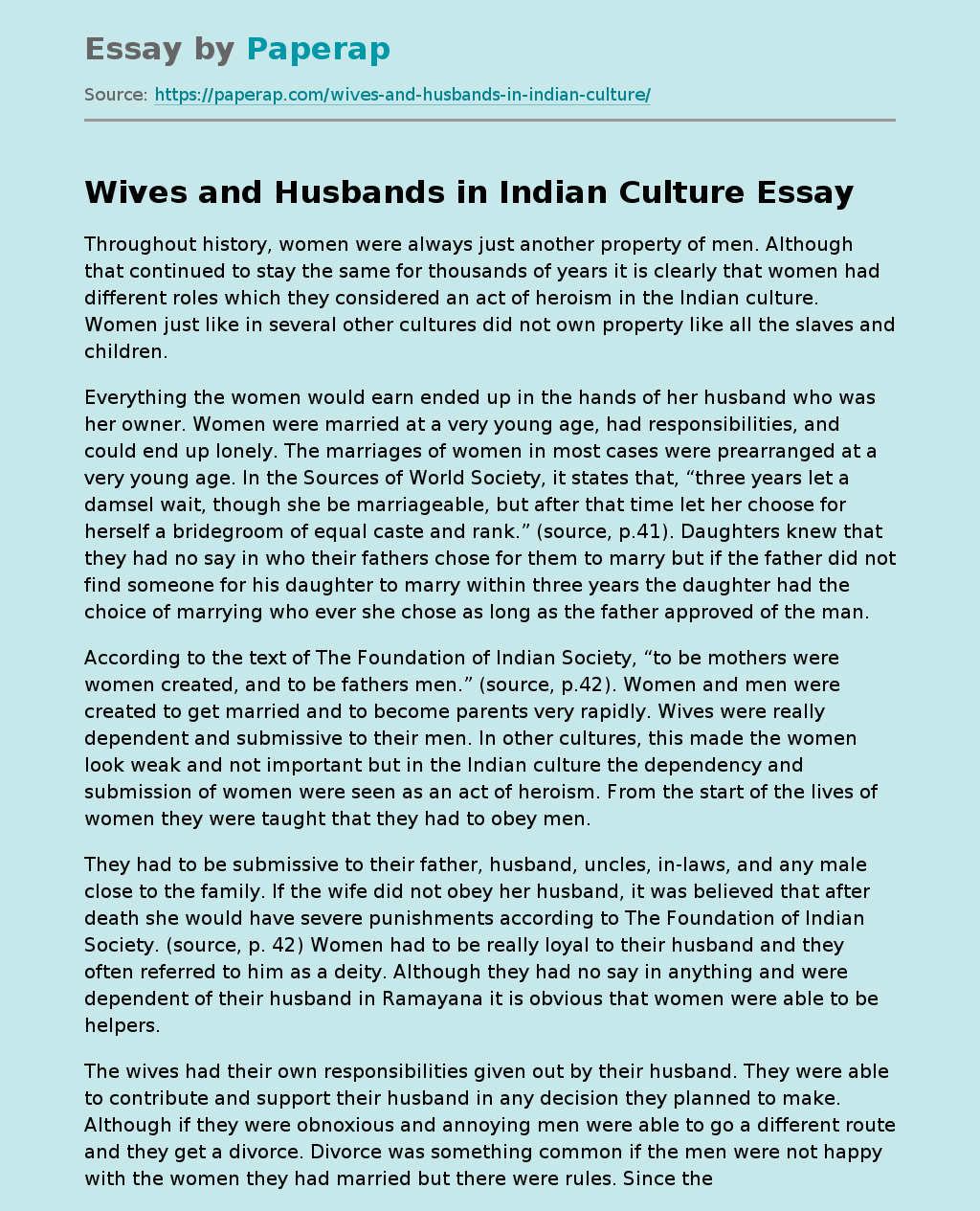Wives and Husbands in Indian Culture
Throughout history, women were always just another property of men. Although that continued to stay the same for thousands of years it is clearly that women had different roles which they considered an act of heroism in the Indian culture. Women just like in several other cultures did not own property like all the slaves and children.
Everything the women would earn ended up in the hands of her husband who was her owner. Women were married at a very young age, had responsibilities, and could end up lonely.
The marriages of women in most cases were prearranged at a very young age. In the Sources of World Society, it states that, “three years let a damsel wait, though she be marriageable, but after that time let her choose for herself a bridegroom of equal caste and rank.” (source, p.41). Daughters knew that they had no say in who their fathers chose for them to marry but if the father did not find someone for his daughter to marry within three years the daughter had the choice of marrying who ever she chose as long as the father approved of the man.
According to the text of The Foundation of Indian Society, “to be mothers were women created, and to be fathers men.” (source, p.42). Women and men were created to get married and to become parents very rapidly. Wives were really dependent and submissive to their men. In other cultures, this made the women look weak and not important but in the Indian culture the dependency and submission of women were seen as an act of heroism.
From the start of the lives of women they were taught that they had to obey men.
They had to be submissive to their father, husband, uncles, in-laws, and any male close to the family. If the wife did not obey her husband, it was believed that after death she would have severe punishments according to The Foundation of Indian Society. (source, p. 42) Women had to be really loyal to their husband and they often referred to him as a deity. Although they had no say in anything and were dependent of their husband in Ramayana it is obvious that women were able to be helpers.
The wives had their own responsibilities given out by their husband. They were able to contribute and support their husband in any decision they planned to make. Although if they were obnoxious and annoying men were able to go a different route and they get a divorce. Divorce was something common if the men were not happy with the women they had married but there were rules. Since the beginning of history, it was always important for women to be able to have children and take care of them. If this was not the case and the wife was barren, had only girls, or all children died within a certain amount of time the husband could divorce and replace her with someone else. Also, if she hated her husband within a year he could ask for a divorce and all her properties would entirely be his instead of her offspring’s.
In Ramayana, Sita begged Rama to not abandon her when his father, the king, sent him to go live in the forest for fourteen years. Sita wanted to go live with him because they loved each other, and she wanted to be with Rama. Sita states in Ramayana that, “if from feelings of love I follow you, my pure-hearted husband, I shall have no sin to answer for, because my husband is my deity” (textbook, p. 71). She insists and begs that he does not leave her. In Ramayana it is presents a different culture because both women in the story get what they want.
The king’s wife gets what the king had promised and Sita ends up going with Rama to the forest. Loneliness was definitely an option for Sita. The roles of women are not remarkably close to what people are accustom to now a day. The age at which girls were considered women to marry is astonishing. Women had no voice or ownership of anything but still were submissive enough to refer to their husband as god. Women were always dependent on men and they were really loyal. Without a right to anything, women were considered heroes.
Wives and Husbands in Indian Culture. (2021, Dec 11). Retrieved from https://paperap.com/wives-and-husbands-in-indian-culture/

